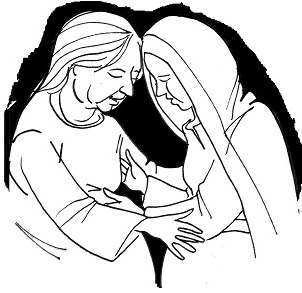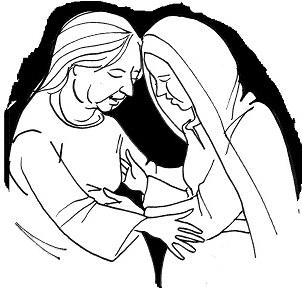

“My soul magnifies the Lord” (Luke 1:46).
I Sam 1:24-28; Luke 1:46-56
Some years ago in a church sacristy in Chicago, a priest asked one of the altar servers to go into the walk-in safe where the chalices were kept to get the monstrance. The boy looked at the other server as if to say, “I’m not going anywhere to get any monster,” but the priest was already coming out of the safe with the large, silver cruciform with the little window at the center where a host is placed for display at adoration. He asked the boy what he thought it was, and he replied, “It looks like a big magnifying glass.”
The story occurs to me whenever the Magnificat appears in the readings, as it does in today’s Gospel. Mary’s canticle occurs during her visit to Elizabeth, their miraculous pregnancies bringing them together to proclaim the wonder of God’s presence in their lives. Elizabeth praises God for keeping his promises, and Mary says, “My soul magnifies the Lord!” She is God’s “lowly servant,” yet salvation will be magnified to the whole world because of the child she is carrying.
Mary’s song follows the form of other canticles in the Bible, including the one by Hannah, mother of the prophet Samuel. Despite the long-suffering state of the poor and lowly in a world run by the proud and the powerful, God will turn history upside down in a great reversal to vindicate his beloved anawim. Mary’s child will bring God’s justice to the earth.
The Magnificat also shows how this is to happen. God’s answer to human injustice will appear not in a display of worldly power but in the hidden “glory” of humility and vulnerability. Jesus will be this kind of Christ. He will be a champion to the poor, an advocate and exemplar for the crucified of history. He will overturn the proud and powerful by raising up the humble and the lowly into the light of truth. What has been covered by darkness and blocked by blindness will be magnified for all to see.
For Luke and Matthew, the birth of Jesus arrives like a secret that must be whispered and hidden to be protected. The shepherds, familiar with the silence of night, will hear the song of angels in the wind. The astrologers knew the movement of celestial lights, so they will recognize their summons to Bethlehem. Jesus is born in obscurity and will remain anonymous most of this life. His brief public ministry will be cloaked in paradox and parables. His death will seem to erase him from history until a pinpoint of light reappears, slowly magnifies and brightens until it fills the world with new hope, radical ideas and a desire for justice that nothing can extinguish. The Canticle Mary began in the house of Elizabeth is the song we proclaim at Christmas.
Advertisement






